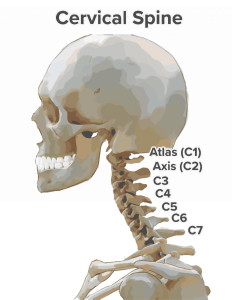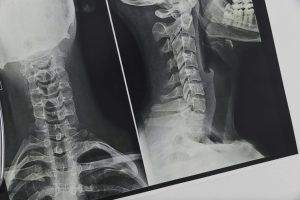Neck Pain After Car Accidents: What Could Be the Cause?
Car accidents are the leading cause of long-term neck pain in the United States, accounting for more than 800,000 injury cases annually. If you’re suffering neck pain after a car accident, a traumatic injury such as a spinal fracture, herniated disc, or whiplash may be to blame.
Even though a modern vehicle is equipped with life-saving seatbelts and airbags, neither properly secures the neck and head during a collision. While the rest of the body remains strapped to a car seat, the neck and head move freely with the motion of the vehicle. This means that the delicate structures of the neck can be violently jerked forward, backward, or side to side.
The rapid motion of a crash can stretch, tear, and severely damage every part of the neck, causing a variety of pain symptoms that can last for more than six weeks after a car accident. If you believe you’ve suffered a neck injury in a car accident, discover how medical and legal experts can help.

Parts of the Neck That Could be Injured in a Car Accident
The neck is a complex part of the spinal column that extends from the base of the skull to the top of the shoulders. Medically known as the cervical spine, the neck is composed of seven small, ring-shaped bones called vertebrae. In between each vertebra are facet joints that connect each bone and intervertebral discs that provide cushioning shock support.
The neck bones are supported by multiple types of soft tissue and fibrous connective tissue, including muscles, tendons, and ligaments. These tissues help give the cervical spine mobility and further protect the spinal cord housed within the spinal column. The spinal cord is one-half of the body’s central nervous system (CNS), a network of nerves that controls communication between the body and the brain.
Even though any part of the neck can be injured in a car crash, some structures are more prone to damage than others. It’s typically more common to stretch or tear tissue than shatter an entire bone because it takes more force to damage hard bone than soft tissue. Delicate structures will be more vulnerable to injury during a typical accident.
Neck Injury Risk Factors
Car crashes are a leading risk factor for neck injuries in the United States. However, additional factors that may contribute to the development of a neck injury if a car accident occurs. These factors include various pre-existing conditions and the direction of a crash.
Risk factors for neck pain after a car accident include:
- Medically-documented cervical arthritis
- Previous damage or trauma to the cervical spine
- History of neck pain from ergonomically-incorrect workstations
- Whether the vehicle was struck from the front, side, or rear
- Current age the time of the collision
- The speed of the crash
A victim’s body placement at the time of the crash may also impact the risk of severe injury. Tight or active muscles are more likely to become damaged from the impact force of a crash than relaxed muscles. Accident victims who grip the steering wheel or lift their shoulders to brace for impact may be at higher risk of injury.

Symptoms of Car Accident Neck Injuries
It’s common for an injured neck to begin to be sore, swollen, and difficult to move in the hours after a motor vehicle collision. Symptoms such as loss of consciousness, vomiting, or numbness in the hands or feet require immediate medical treatment, as they could be a sign of a severe spinal cord injury that may have life-changing consequences.
If you feel immediate neck pain after a car accident, visit a doctor for the following symptoms:
- Numbness or tingling in the arms or hands
- Nausea or vomiting
- Loss of consciousness
- Extreme fatigue or lethargy
- Blurred vision
- Tinnitus (ringing in the ears)
- Loss of range of motion
- Memory problems
- Difficulty concentrating
- Trouble sleeping
- Dizziness
- Headache at the base of the skull
- Neck pain and stiffness
- Pain that increases with neck movement
- Tenderness in the shoulders or upper back
A neck injury may not present pain symptoms right away. It’s common for neck injuries to create delayed symptoms or pain that does not begin until 24 to 48 hours after the accident. In some cases, neck pain after a car accident may not begin until an entire week later. If you didn’t seek medical attention immediately after an accident, visit a doctor for these delayed symptoms.
- Chronic neck pain
- Burning or throbbing pain in the neck or shoulder
- Pain that radiates down the arms
- Memory loss (amnesia)
- Emotional changes, such as anxiety and depression
- Loss of range of motion
- Neck pain and stiffness
Common Neck Injuries After a Car Accident
From rear-end collisions to front impact accidents, any type of car crash can cause debilitating neck injuries. If you have neck pain after a car accident, you may have suffered a neck injury. Take a look at the most common types of neck injuries after a crash.
Whiplash: Neck Sprain or Strain
Whiplash is among the most common car accident neck injuries. Also referred to as a neck sprain or neck strain, a whiplash injury occurs when a car accident’s rapid back and forth movement stretches or tears the ligaments and tendons in the cervical spine. In severe cases, the force of an accident can also damage facet joints.
Common symptoms of whiplash include throbbing or shooting pain in the neck, stiffness, inability to turn the neck side-to-side, and headaches in the base of the skull. Whiplash injury symptoms may begin at the scene of the accident—they may also be delayed by several weeks. Since symptoms may take some time to develop, you should always get checked for whiplash immediately.
Fortunately, you can fully recover from whiplash—as long as you seek early treatment. Whiplash can heal within four to six weeks with proper care. Severe whiplash injuries can cause chronic pain or a worsening of symptoms, such as headaches or memory loss, without medical care and rest.
Cervical Spine Fracture or Compression Fracture
A cervical spine fracture is a partial or total break in one of the seven vertebrae of the neck. A compression fracture is when the bone crumbles, potentially lodging shattered pieces of the vertebra into the spinal canal. This is an incredibly dangerous injury that can damage the sensitive spinal cord and can cause numbness, chronic, or even paralysis.
Typically, you will know right away if you have a neck fracture after an accident, as pain will begin instantly. Common symptoms of a fracture include neck pain, numbness, and weakness in the hands and arms. Depending on the fracture’s severity, you may require neck braces or surgery to restabilize the area.
Herniated Disc
Each cervical vertebra is cushioned by a spinal disc that absorbs the shock and pressure from daily activities, such as walking or jumping. Your intervertebral discs can absorb far too much energy during a car accident, forcing the hard exterior of the disc to rupture and release fluid into the spinal canal. This injury is known as a herniated disc.
Herniated disc symptoms include pain in the neck, shoulder, muscle weakness and muscle spasms. The fluid from a herniated disc can also press on sensitive nerves when it enters the spinal canal, causing tingling, burning, numbness, or shooting pain. Most herniated discs heal on their own but may require medical intervention to alleviate pain and swelling.
Cervical Spondylolisthesis
Cervical spondylolisthesis is the medical term for a slipped disc in the neck. A slipped disc occurs when the force of impact during a car crash forces one intervertebral disc to bulge out of its normal position in the spinal column. In many cases, the slipped disc rests on the disc above or below it, creating extreme inflammation in the spinal column.
Inflammation in the spinal column can cause narrowing in the spinal canal, known as spinal stenosis. Cervical spondylolisthesis and spinal stenosis symptoms include pain and stiffness in the neck and shoulders, limited mobility, and shooting or burning nerve pain. These injuries may require surgery to heal.
Pinched Nerve
There are 31 pairs of spinal nerves in the spinal cord. A pinched nerve occurs when inflammation or a shifted structure presses on a nerve root. When a nerve becomes compressed, it will create a burning, tingling, or numbness sensation and shooting pain down the arm or leg. A minor pinched nerve may heal with physical therapy and chiropractic care, where severe cases may require surgery.
Facet Joint Injury
Facet joints connect the individual bones of the neck and allow for cervical mobility and stabilization. The trauma of a car accident can dislocate facet joints. Joints can also be pulled out of place by ligaments damaged by whiplash or other accident injuries.
Joint injuries may present immediate or delayed symptoms including neck stiffness and sensitivity, swelling, and limited range of motion. With rest, hot compresses, and hydration, joint injuries can heal on their own within two to four weeks.
Muscle and Tendon Stiffness
Cervical muscles and tendons are responsible for supporting, protecting, and mobilizing the neck. Cervical stiffness typically occurs as a result of inflammation caused by trauma to the area and may limit range of motion. Stiff neck from whiplash or other accident injuries may last two to four weeks, depending on the severity of the primary injury.
Muscle Spasms
Muscle spasms occur when the soft tissue of the neck randomly contracts and releases, causing pain, swelling, and stiffness. Muscle spasms generally indicate a larger muscle injury, such as a neck sprain. Spasms may last up to two weeks and should be examined by a medical professional if they continue longer than one month.
Lacerations and Contusions (Cuts and Bruises)
Lacerations and contusions are some of the most common minor accident injuries. A laceration is a deep cut or tear on the surface of the skin. A contusion is an area of broken blood capillaries beneath the skin’s surface commonly called a bruise. These accident injuries may seem harmless, but a doctor should examine both to confirm there’s no further damage.

How Neck Pain is Diagnosed and Treated
Proper treatment for neck pain after a car accident always begins with an accurate diagnosis from a medical professional. Without a diagnosis, you could begin at-home treatment that ultimately makes the damage worse. Rather than risk long-term pain and complications—and potentially damage your personal injury claim—seek medical attention.
A doctor can locate and identify the source of neck pain after a car accident to help you form a solid injury case against the individual responsible for your accident. To diagnose the injury and begin treatment, a doctor will likely utilize a variety of tests, including:
- Physical strength tests
- X-rays
- Magnetic Resonance Imaging (MRI)
- Computed Tomography Scans (CT Scans)
Treatment for a severe neck injury may require using a neck brace to stabilize the area or surgery to realign the spine’s structure. Minor injuries, such as stiff muscles, may require months of pain medication, heat therapy, massage therapy, physical therapy, and chiropractic care to heal. Medical care may be ongoing for months after a crash, so you should seek an attorney for help gaining compensation for your costly expenses.
Can You File a Lawsuit for Neck Pain Caused by a Car Accident?
Yes, you can file a lawsuit for neck pain caused by a car accident. A lawsuit is a legal action that holds the at-fault driver responsible for your medical bills and lost wages. A neck injury from a car accident is likely to incur several costly fees, including:
- Past and future medical bills
- Home care or assistance
- Out-of-pocket medical costs
- Travel costs to doctor’s visits
- Prescription costs
- Pain and suffering
- Emotional distress
- Lost wages, including sick leave and vacation
- Property damage
With the help of a car accident attorney, you can file a personal injury claim to recoup your money spent on an accident injury that was not your fault. An attorney can help prove to the insurance company, judge, or jury that your pain and suffering is a direct result of the at-fault driver and hold them accountable for your expenses.
The Bryant Law Center is Here to Help with Car Accident Neck Pain
If you or someone you love is suffering from neck pain after a car accident, do not navigate these uncharted territories alone. Seek the guidance of a trusted personal injury attorney who is knowledgeable in car accident law. At Bryant Law Center, we have decades of experience helping car accident victims seek justice and are ready to help you with your car accident neck pain.
In the state of Kentucky, you have just two years from the day of the accident to file a lawsuit against the individual responsible for your injury. Do not wait another day to seek help with your neck injury claim. Contact Bryant Law Center today for a free, no-obligation consultation to learn more about how to take your first steps to compensation for a neck injury.
